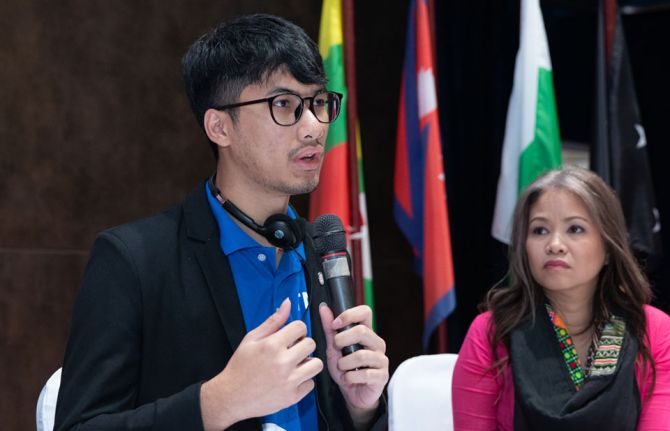

Feature Story
Empowering young people living with HIV to become agents of change in Thailand
23 January 2020
23 January 2020 23 January 2020There are approximately 24 000 young people aged 15–24 years living with HIV in Thailand. In 2018, young people accounted for nearly half of the 6400 new HIV infections in the country.
Thailand has made great strides in its AIDS response, providing antiretroviral therapy free of charge as part of its universal health coverage scheme. However, adolescents and young people living with HIV often fall out of care or do not receive the support they need to remain on treatment. Self-stigma, stigma and discrimination and transition from paediatric care to adult care are some of the challenges faced by adolescents and young people living with HIV.
To close this gap, three years ago the United Nations Children’s Fund (UNICEF) and other national partners led by the Thai Network of People Living with HIV created the Thai Network of Youth Living with HIV. The main objective was to empower adolescents and young people living with HIV to be agents of the change that they wanted to see in their lives. The network’s capacity was built to provide referral services, life-skills training and peer-to-peer support for adolescents and young people living with HIV.
Kritthanan Ditthabanjong, one of the first active members, is now Head of Corporate Communication at the network. Studying to become a journalist, he also works as a content editor for websites and magazines in Thailand and is a well-recognized young leader. Mr Ditthabanjong represents the network at public events and in the media, voicing the needs of young people living with HIV.
“I have publicly disclosed my HIV-positive status because I want other people to learn from my experiences and to give young people the information they need to lead healthy and dignified lives. I feel confident to speak out because I have support from my friends and community,” he said.
With technical and financial support from UNICEF and other partners, and through a variety of platforms and strategies, the network offers emotional support around receiving an HIV-positive diagnosis, provides HIV information to reduce self-stigma, builds coping skills and creates a supporting network to tackle stigma and discrimination. “Young people living with HIV need emotional support and a community they can trust,” said Mr Ditthabanjong.
Trained young leaders with the network provide counselling for young people living with HIV and link them to health facilities, hospitals and community-led services for HIV treatment and care. The young leaders also accompany young people living with HIV to medical appointments and carry out follow-up home visits to help them adhere to treatment.
The network uses social media to reach out to young people, providing information on HIV and promoting self-acceptance. Initiatives such as the online campaign Growing Up with HIV offer safe spaces that enable young people to ask questions about different topics, including HIV prevention and safe sex, and share opinions and thoughts.
“Growing Up with HIV allows young people to be part of our community and make them feel they are not alone,” continues Mr Ditthabanjong.
Mr Ditthabanjong engages in other campaigns and social media initiatives with UNICEF that address young people in general in Thailand but also allow him to bring in the voices and perspectives of young people living with HIV. He has recently joined Dare to Dream, a public campaign created by UNICEF for Thai young people to voice their opinions on education and what is required to prepare them for the transition to adulthood. “From a shy adolescent who did not wish to speak and constantly glanced at his counsellor for approval a few years ago, Mr Ditthabanjong followed a path with us and he was one of nine motivational speakers at the Dare to Dream youth campaign, a role model for young people in his country,” said a UNICEF staff member.
Mr Ditthabanjong concludes, “One day I had an interview on social media. As soon as I came off, I received a text from a young person who had recently been diagnosed with HIV. “My mum and dad do not accept me, and I want to kill myself,” he said. I phoned him, met him and convinced him to join our network. Now this person is doing well. Our work is impacting people’s lives.”



